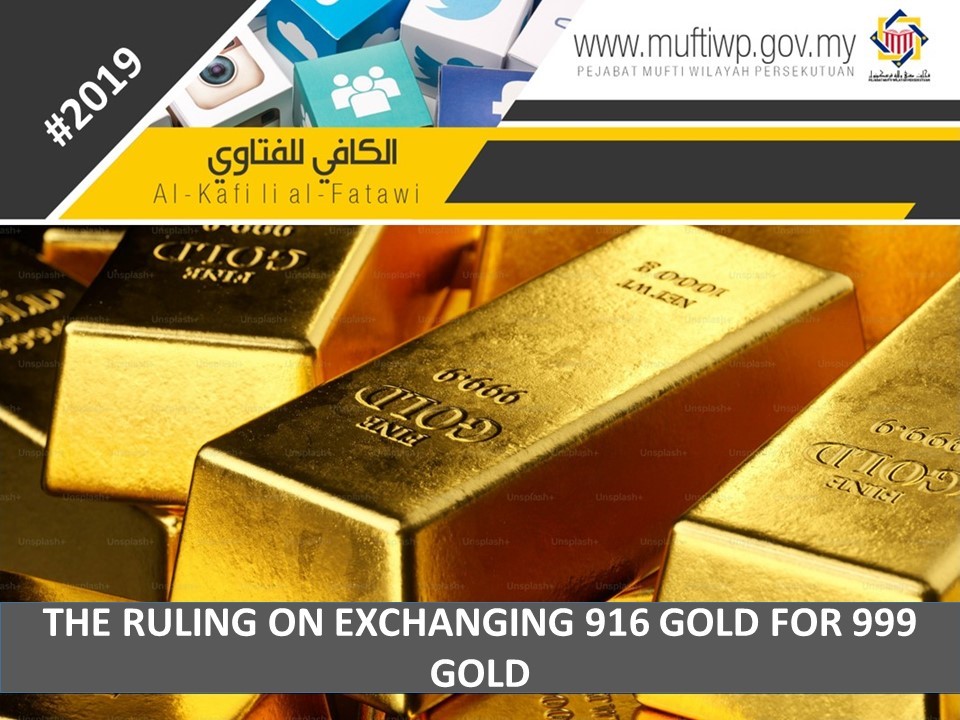
QUESTION
What is the ruling on exchanging 916 gold for 999 gold?
ANSWER
One of the conditions for exchanging gold with gold is that both the weight and purity must be equal. Therefore, exchanging gold of different purities, even if the weight is the same, is prohibited (haram) because the quantity and value of the gold differ.
EXPLANATION
Gold is one of the ribawi items. Therefore, any sale, purchase or exchange transaction involving ribawi items must adhere to the procedures and guidelines set by Islamic law to avoid falling into the practice of riba (usury). The designation of gold as a ribawi item is mentioned in a hadith narrated by ‘Ubadah bin al-Samit RA, in which the Prophet Muhammad SAW said:
الذَّهَبُ بالذَّهَبِ، والْفِضَّةُ بالفِضَّةِ، والْبُرُّ بالبُرِّ، والشَّعِيرُ بالشَّعِيرِ، والتَّمْرُ بالتَّمْرِ، والْمِلْحُ بالمِلْحِ، مِثْلًا بمِثْلٍ، سَواءً بسَواءٍ، يَدًا بيَدٍ، فإذا اخْتَلَفَتْ هذِه الأصْنافُ، فَبِيعُوا كيفَ شِئْتُمْ، إذا كانَ يَدًا بيَدٍ
Meaning: "Gold for gold, silver for silver, wheat for wheat, barley for barley, dates for dates, and salt for salt — like for like, equal for equal, hand to hand (i.e., immediate exchange). If these kinds differ, then sell as you wish, provided it is hand to hand."
(Narrated by Muslim)
Based on this hadith, any transaction involving buying, selling, or exchanging gold with another item of the same type must fulfil two conditions: immediate handover (on-the-spot exchange) during the contract session and equality in quantity as recognized by Islamic law. Therefore, any addition or reduction in weight when selling or exchanging gold for gold is not permitted.
This also includes equality in terms of the purity of the gold. Gold mixed with other materials, such as copper and silver, does not store the same value as pure gold. For example, 999 gold does not store the same value as 916 gold. Therefore, such exchange is not allowed as there is a difference in value.
This is further reinforced by the view of the Accounting and Auditing Organization for Islamic Financial Institutions (AAOIFI) in clause number 3.3.1.2.
النوع الثاني: ذهب خلط بشيء غير مقصود بذاته، والمقصود من الخلط تعيير الذهب أو تلوينه وما أشبه ذلك، مثل خلط مواد بنسب معينة لجعل الذهب من عيار معين كعيار (٢١) أو عيار (١٨). فالمواد المضافة إلى الذهب غير مقصودة بذاتها فيجب عند بيع بعضها ببعض التقابض والتحقق من تساوي وزن الذهب الخالص في كل من البدلين
Meaning: “The second type: where gold is mixed with a substance not intended per se; rather the substance is intended for the purposes of standardizing or coloring gold, etc. For example, when a substance is added to gold in specific proportions to render it of a certain standard (karatage), such as 21K or 18K. In this case, the substances added to the gold are not intended per se. Therefore, the exchange of one counter-value for the other must be spot and the weight of pure gold in each of the two counter-values must be equal.”
Therefore, anyone who wishes to exchange their gold for another piece of gold must ensure equality in both weight and purity without any addition or reduction. An alternative method to practice in transactions involving gold of different purities but equal weight is to first sell their gold for cash, then purchase the desired gold using that money.
In conclusion, one of the conditions for exchanging gold with gold is that both the weight and purity must be equal. Therefore, exchanging gold of different purities, even if the weight is the same, is prohibited (haram) because the quantity and value of the gold differ.

